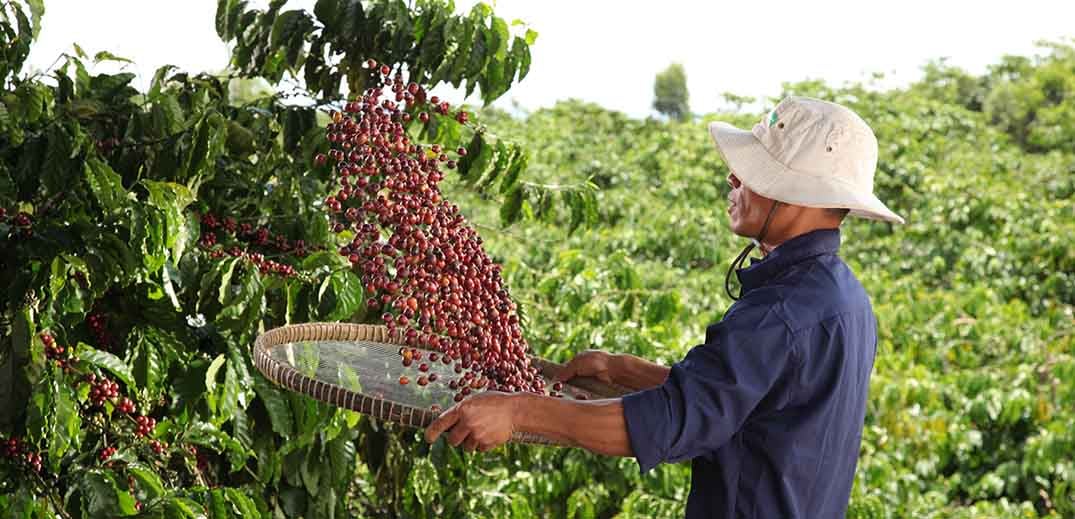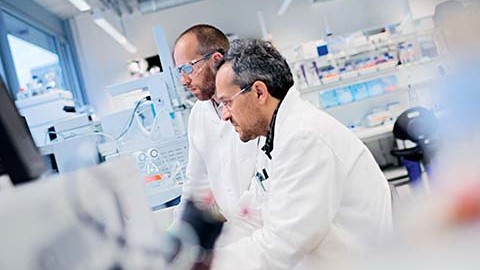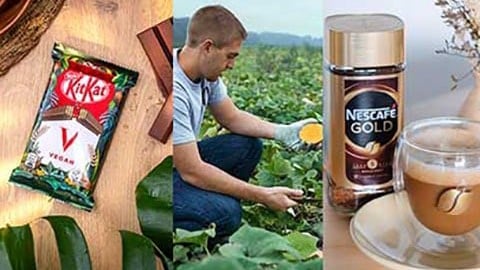Providing smallholder coffee farmers with financial protection
Climate change is putting coffee-growing areas under pressure. Smallholder coffee farmers are exposed to the risk of irregular weather conditions that can affect their crops.
On the occasion of International Coffee Day, Nestlé announces that it is piloting a weather insurance program in Indonesia for more than 800 smallholder coffee farmers that supply coffee to its brand Nescafé. The company is launching the insurance scheme in collaboration with Blue Marble, a specialist in climate insurance. The insurance provides financial protection to help farmers cope with unpredictable weather patterns of rainfall and severe drought.
Marcelo Burity, Global Head of Nestlé's Green Coffee Development, said: "This weather insurance helps to establish a support mechanism for smallholder coffee farmers in Indonesia. It allows them to access financial resources to re-establish their crops in the event of irregular weather conditions while building resilience in coffee farms."
The insurance uses satellite-based climate data to determine when coffee output has been impacted by either too much or not enough rainfall during key phases of the crop cycle. Payments are issued automatically to registered coffee farmers that have been affected, according to the severity of the weather.
"Smallholder coffee farmers in Indonesia are vulnerable to climate risks and need access to insurance to protect against extreme weather events," said Jaime de Piniés, CEO of Blue Marble. "We are proud to partner with Nestlé and its brand Nescafé to develop innovative ways to support the climate adaptation of smallholder coffee farmers and their families."
This initiative is an integral part of the Nescafé Plan 2030, the brand's vision to support the long term sustainability of coffee and to help improve farmers' livelihoods. Based on the results of the pilot, Nestlé will determine whether to expand the approach to other Nescafé sourcing locations around the world.
Sharing knowledge to accelerate the transition to regenerative agriculture
Changing agricultural practices requires access to knowledge and time to learn and implement. By moving to regenerative agriculture, coffee farmers can help restore soil health, reverse biodiversity loss, and strengthen ecosystems. Doing so also helps reduce the amount of greenhouse gases released into the atmosphere.
Nestlé, has contributed to the 'Regenerative Agriculture for Low-Carbon and Resilient Coffee Farms - A Practical Guidebook,' developed by the Alliance of Bioversity International and the International Center for Tropical Agriculture (CIAT). This guidebook provides field agronomists, trainers and professionals working with coffee farmers with a set of best practices that they can use and adapt to different farming contexts, helping farmers transition to regenerative agriculture. These best practices include agroforestry, intercropping, soil conservation and cover crops, integrated weed and pest management, integrated nutrient management, efficient water use, waste valorization, landscape actions and the rejuvenation of coffee trees with well adapted varieties.
Pascal Chapot, Global Head of Sustainable Agriculture Development at Nestlé, said: "The guidebook gives coffee farmers a set of field actions they can implement tomorrow to help them become more resilient to climate change and to diversify their sources of income. Knowledge is key, and we hope that this guidebook makes these regenerative agriculture practices more accessible to farmers and supports an accelerated transition towards them. This is essential to tackling the climate challenges ahead."
Mirjam Pulleman, senior soil ecologist and co-author of the guidebook said: "Creating real impact on the ground requires learning from real experiences with farmers in different origins and providing incentives to support farmers in their journey. The best practices highlighted in the guidebook are a starting point. Each practice will need to be tailored to the specificities of each country of origin, the different farm types, the surrounding landscapes and the resources available."
From Nestlé's perspective, the guidebook complements the Nestlé Regenerative Agriculture Framework (pdf, 18Mb). Nestlé considers regenerative agriculture to be a key component of its efforts to reduce greenhouse gas emissions and to reach net zero by 2050. It is also a central pillar of its coffee sustainability programs, the Nescafé Plan 2030 and the Nespresso AAA Sustainable Quality™ program.
About Blue Marble
Blue Marble works with private and public sector partners in twelve countries across Latin America, Africa and Asia to deliver protection to underserved families and businesses. Leveraging its proven, proprietary technology, Blue Marble supports the climate adaptation of populations most vulnerable to the devastating impact of climate risks by delivering tailored, affordable insurance solutions.
About the Alliance of Bioversity International and the International Center for Tropical Agriculture (CIAT)
The Alliance of Bioversity International and the International Center for Tropical Agriculture (CIAT) delivers research-based solutions that harness agricultural biodiversity and sustainably transform food systems to improve people’s lives. Alliance solutions address the global crises of malnutrition, climate change, biodiversity loss, and environmental degradation. With novel partnerships, the Alliance generates evidence and mainstreams innovations to transform food systems and landscapes so that they sustain the planet, drive prosperity, and nourish people in a climate crisis. The Alliance is part of CGIAR, a global research partnership for a food-secure future.








